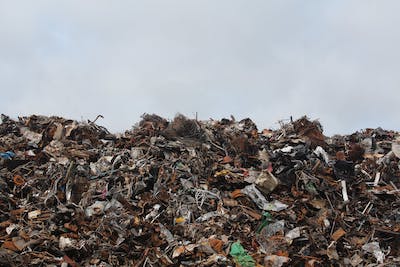A recent study by Material Focus found that in the UK alone, almost 500 million small electrical items, called “Fast Tech,” were thrown away last year. These items include things like cables, lights, mini fans, and disposable vapes. They are the fastest-growing type of electronic waste. The study also discovered that the average household has around 30 unused electrical items just sitting around. These items actually have valuable materials inside that can be recycled.
Material Focus is a not-for-profit group that did a survey of 2000 people to gather this information. The survey showed that these “Fast Tech” items usually cost around £4, which makes people think of them as disposable. But they actually have valuable stuff like copper wires and lithium batteries that can be recovered through recycling. Scott Butler, the executive director of Material Focus, wants people to understand that anything with a plug, battery, or cable can be recycled and it’s really important to do so.
This isn’t just a problem in the UK, it’s a global issue. People all over the world throw away 9 billion kg of electronic waste every year, including things like cables, toys, vapes, and novelty clothes. Many people don’t even realize that these things count as e-waste. However, more and more people are starting to recycle their electricals, with 60% of people saying they do. But even with this progress, lots of people still have old electrical items just gathering dust in their homes.
To recycle electricals, you can sell them, donate them, get them repaired, or recycle them. There are places like recycling centers, libraries, and other locations that accept old electricals for collection. Some councils even offer a service where they come to your door to collect them. It’s also important to know that retailers who sell electricals are required to help customers get rid of their old products, even if they didn’t sell them in the first place. The Recycle Your Electricals website can help you find local recycling facilities. Material Focus is a not-for-profit organization that promotes recycling and is funded by fees paid by electrical producers when they don’t meet government recycling targets.
Original news source: Nearly half a billion small tech items thrown away (BBC)
Listen
Slow
Normal
Fast
Group or Classroom Activities
Warm-up Activities:
– Charades
Instructions: Divide the class into small groups. Each group will take turns acting out different “Fast Tech” items mentioned in the article. The rest of the group must guess the item being acted out. This activity will help reinforce vocabulary related to electrical items and recycling.
– News Summary
Instructions: Ask students to read the article individually or in pairs. After reading, instruct them to write a summary of the article in their own words. They should focus on the main ideas and key details. Once everyone has finished, have a class discussion where students share their summaries and compare them.
– Keyword Hangman
Instructions: Write down a list of keywords from the article on the board, such as “Fast Tech,” “electronic waste,” and “recycling.” Play a game of Hangman where students have to guess the letters to complete the keywords. This activity will help students practice spelling and reinforce their understanding of important vocabulary from the article.
– Speed Summarizing
Instructions: Divide the class into pairs. One student will have one minute to summarize the article to their partner. The partner should listen carefully and take notes. After one minute, the roles switch and the other student will summarize the article. Encourage students to focus on the main ideas and key details. This activity will help improve students’ listening and summarizing skills.
– Opinion Poll
Instructions: Create a list of discussion questions related to the article, such as “Do you think people should be more aware of the environmental impact of throwing away electrical items?” or “What can individuals do to reduce electronic waste?” Have students discuss these questions in pairs or small groups, and then ask for volunteers to share their opinions with the class. This activity will encourage students to think critically about the topic and express their opinions in English.
Comprehension Questions:
1. According to the study, how many small electrical items were thrown away in the UK last year?
2. What are some examples of “Fast Tech” items mentioned in the article?
3. How many unused electrical items does the average household have?
4. What valuable materials can be found inside these “Fast Tech” items?
5. Who conducted the survey to gather this information?
6. Why do people tend to think of “Fast Tech” items as disposable?
7. How much electronic waste is thrown away globally every year?
8. What are some options for recycling electrical items mentioned in the article?
Go to answers ⇩
Listen and Fill in the Gaps:
A recent (1)______ by (2)______ Focus found that in the UK alone, almost 500 million small electrical (3)______, called “Fast Tech,” were thrown away last year. These items include things like cables, lights, mini fans, and disposable vapes. They are the fastest-growing type of electronic waste. The study also discovered that the average household has around 30 unused electrical items just sitting around. These items actually have valuable (4)______ inside that can be recycled.
Material Focus is a not-for-profit group that did a survey of 2000 people to gather this information. The (5)______ showed that these “Fast Tech” items usually cost around £4, which (6)______ people think of them as (7)______. But they actually have (8)______ stuff like copper wires and lithium batteries that can be recovered through recycling. Scott Butler, the executive director of Material Focus, wants people to understand that anything with a plug, battery, or cable can be recycled and it’s really important to do so.
This isn’t just a problem in the UK, it’s a global issue. People all over the world throw away 9 billion kg of electronic waste every year, including things like cables, toys, vapes, and novelty clothes. Many people don’t even realize that these things count as e-waste. However, more and more people are starting to recycle their (9)______, with 60% of people saying they do. But even with this progress, lots of people still have old electrical items just (10)______ dust in their (11)______.
To recycle electricals, you can sell them, donate them, get them repaired, or recycle them. There are places like recycling (12)______, libraries, and other locations that accept old electricals for collection. Some councils even (13)______ a service where they come to your door to collect them. It’s also important to know that retailers who sell electricals are required to help customers get rid of their old products, even if they didn’t sell them in the first (14)______. The Recycle Your Electricals (15)______ can help you find local recycling facilities. Material Focus is a not-for-profit organization that promotes recycling and is funded by fees paid by electrical producers when they don’t meet government recycling (16)______.
Go to answers ⇩
Discussion Questions:
Students can ask a partner these questions, or discuss them as a group.
1. What is “Fast Tech” and why are these items considered electronic waste?
2. How would you feel if you found out that your old electrical items could be recycled and have valuable materials inside?
3. Do you like the idea of recycling electricals? Why or why not?
4. Do you think it’s important for people to recycle their old electrical items? Why or why not?
5. What are some ways you can recycle your electricals?
6. Have you ever sold or donated your old electrical items? If so, what was your experience like?
7. How do you think recycling electricals can help the environment?
8. Do you think more people should be aware of the importance of recycling electricals? Why or why not?
9. What do you think can be done to encourage more people to recycle their old electrical items?
10. Have you ever had an electrical item repaired instead of throwing it away? If so, what was your experience like?
11. How do you feel about retailers being required to help customers get rid of their old electrical products?
12. Do you think recycling centers and other collection points for old electricals are convenient? Why or why not?
13. Have you ever used a service where someone came to your door to collect your old electrical items? If not, would you be interested in using this service?
14. How do you think Material Focus and other organizations can raise awareness about the importance of recycling electricals?
15. Do you think government recycling targets for electrical producers are effective? Why or why not?
Individual Activities
Vocabulary Meanings:
Match each word to its meaning.
Words:
1. small
2. electrical
3. recycle
4. valuable
5. waste
6. survey
7. global
8. progress
Meanings:
(a) Unwanted or discarded materials
(b) Relating to the whole world
(c) Related to electricity or electronic devices
(d) Forward movement or improvement
(e) Having worth or importance
(f) A study or investigation to gather information
(g) Not big in size
(h) To convert waste materials into reusable materials
Go to answers ⇩
Multiple Choice Questions:
1. What is the fastest-growing type of electronic waste in the UK?
(a) Cables
(b) Lights
(c) “Fast Tech” items
(d) Disposable vapes
2. How many unused electrical items does the average household in the UK have?
(a) Around 10
(b) Around 50
(c) Around 20
(d) Around 30
3. What valuable materials can be found inside “Fast Tech” items?
(a) Copper wires and lithium batteries
(b) Plastic and glass
(c) Paper and cardboard
(d) Aluminum and steel
4. What kind of organization is Material Focus?
(a) For-profit
(b) Not-for-profit
(c) Government-owned
(d) Private
5. How much electronic waste is thrown away globally every year?
(a) 5 billion kg
(b) 12 billion kg
(c) 7 billion kg
(d) 9 billion kg
6. What percentage of people say they recycle their electricals?
(a) 60%
(b) 40%
(c) 80%
(d) 20%
7. What are some ways to recycle electricals?
(a) Throw them away, burn them, bury them, or hide them
(b) Sell them, donate them, get them repaired, or recycle them
(c) Keep them, sell them, use them, or store them
(d) Ignore them, forget them, lose them, or break them
8. Who is required to help customers get rid of their old electrical products?
(a) Recycling centers
(b) Libraries
(c) Retailers who sell electricals
(d) Councils
Go to answers ⇩
True or False Questions:
1. A recent study found that less than 500 million small electrical items were thrown away in the UK last year.
2. People often think of “Slow Tech” items as disposable because they usually cost around £4.
3. Material Focus is a not-for-profit group that conducted a survey of 2000 people to gather this information.
4. The study also found that the average household in the UK has less than 30 unused electrical items.
5. These small electrical items, called “Fast Tech,” include things like cables, lights, mini fans, and disposable vapes.
6. 3. “Fast Tech” items are the fastest-growing type of electronic waste.
7. Anything with a plug, battery, or cable cannot be recycled, and it’s important not to do so.
8. These unused electrical items have valuable materials inside that can be recycled, such as copper wires and lithium batteries.
Go to answers ⇩
Write a Summary:
Write a summary of this news article in two sentences.
Writing Questions:
Answer the following questions. Write as much as you can for each answer.
1. What did the study by Material Focus find about the number of “Fast Tech” items thrown away in the UK last year?
2. What are some examples of “Fast Tech” items mentioned in the article?
3. According to the survey, why do people often consider “Fast Tech” items as disposable?
4. What valuable materials can be found inside “Fast Tech” items?
5. What are some ways that people can recycle their old electrical items?
Answers
Comprehension Question Answers:
1. According to the study, almost 500 million small electrical items were thrown away in the UK last year.
2. Some examples of “Fast Tech” items mentioned in the article are cables, lights, mini fans, and disposable vapes.
3. The average household has around 30 unused electrical items.
4. These “Fast Tech” items contain valuable materials like copper wires and lithium batteries that can be recovered through recycling.
5. The survey was conducted by Material Focus, a not-for-profit group.
6. People tend to think of “Fast Tech” items as disposable because they usually cost around £4, which makes them seem cheap and not worth keeping.
7. Globally, 9 billion kg of electronic waste is thrown away every year.
8. Some options for recycling electrical items mentioned in the article are selling them, donating them, getting them repaired, or recycling them at recycling centers, libraries, or other collection locations. Some councils even offer a service where they come to your door to collect old electrical items. Retailers who sell electricals are also required to help customers get rid of their old products, even if they didn’t sell them in the first place. The Recycle Your Electricals website can help you find local recycling facilities.
Go back to questions ⇧
Listen and Fill in the Gaps Answers:
(1) study
(2) Material
(3) items
(4) materials
(5) survey
(6) makes
(7) disposable
(8) valuable
(9) electricals
(10) gathering
(11) homes
(12) centers
(13) offer
(14) place
(15) website
(16) targets
Go back to questions ⇧
Vocabulary Meanings Answers:
1. small
Answer: (g) Not big in size
2. electrical
Answer: (c) Related to electricity or electronic devices
3. recycle
Answer: (h) To convert waste materials into reusable materials
4. valuable
Answer: (e) Having worth or importance
5. waste
Answer: (a) Unwanted or discarded materials
6. survey
Answer: (f) A study or investigation to gather information
7. global
Answer: (b) Relating to the whole world
8. progress
Answer: (d) Forward movement or improvement
Go back to questions ⇧
Multiple Choice Answers:
1. What is the fastest-growing type of electronic waste in the UK?
Answer: (c) “Fast Tech” items
2. How many unused electrical items does the average household in the UK have?
Answer: (d) Around 30
3. What valuable materials can be found inside “Fast Tech” items?
Answer: (a) Copper wires and lithium batteries
4. What kind of organization is Material Focus?
Answer: (b) Not-for-profit
5. How much electronic waste is thrown away globally every year?
Answer: (d) 9 billion kg
6. What percentage of people say they recycle their electricals?
Answer: (a) 60%
7. What are some ways to recycle electricals?
Answer: (b) Sell them, donate them, get them repaired, or recycle them
8. Who is required to help customers get rid of their old electrical products?
Answer: (c) Retailers who sell electricals
Go back to questions ⇧
True or False Answers:
1. A recent study found that less than 500 million small electrical items were thrown away in the UK last year. (Answer: False)
2. People often think of “Slow Tech” items as disposable because they usually cost around £4. (Answer: False)
3. Material Focus is a not-for-profit group that conducted a survey of 2000 people to gather this information. (Answer: True)
4. The study also found that the average household in the UK has less than 30 unused electrical items. (Answer: False)
5. These small electrical items, called “Fast Tech,” include things like cables, lights, mini fans, and disposable vapes. (Answer: True)
6. 3. “Fast Tech” items are the fastest-growing type of electronic waste. (Answer: True)
7. Anything with a plug, battery, or cable cannot be recycled, and it’s important not to do so. (Answer: False)
8. These unused electrical items have valuable materials inside that can be recycled, such as copper wires and lithium batteries. (Answer: True)
Go back to questions ⇧












